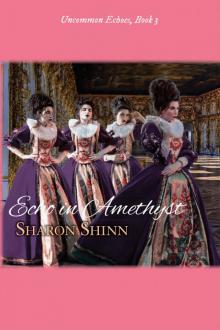- Home
- Sharon Shinn
Jeweled Fire Page 5
Jeweled Fire Read online
Page 5
It wasn’t until Corene started spending time with her father and Zoe that she realized even the lowest kitchen maid, even the rawest footman, was an individual person with thoughts and feelings and dreams just as distinct and real as Corene’s own. It had been quite a shock. But nobody was invisible to Zoe; no one was worthless. If possible, Corene’s sister Josetta felt even more strongly on the subject, since Josetta spent half her days in the slums of Chialto, ministering to the poor.
Corene knew she wasn’t as bighearted as either one of them, but this was a lesson she’d embraced with zeal. She’d started acknowledging housekeepers, merchants, restaurant owners, beggars on the street—meeting everyone’s eyes like an equal. She hadn’t changed her behavior expecting any kind of payoff, but the rewards had been huge. Cooks saved the best portions for her, footmen warned her when there were unexpected guests in the parlor. Every single person in her mother’s employment was devoted to Corene, and hadn’t that proved handy when Alys’s husband—well. When he took an inappropriate interest in Corene and her bedroom habits. The maids had taken turns sleeping in Corene’s room with her to make sure Dominic couldn’t surprise her in the night. And they’d been only too happy to pack up her things when Darien learned the truth of the situation and permanently removed her from her mother’s house.
Now Corene had permanently removed herself from Darien’s house as well. Time to charm a whole new set of servants—or not, if Emilita’s diffidence was anything to go by. Maybe Corene would have better luck once she’d managed to learn the language.
She had washed up in the deliciously hot water of the bathing room, and now she was wrapped in a robe of Emilita’s providing, surveying the contents of her luggage. The maid had hung everything in the huge closet that took up one whole wall of the bedroom. Corene hadn’t been traveling with a very big wardrobe when she made the spontaneous decision to leave with Filomara, so her clothes filled only a fraction of the available space. But at least she had some of her finest tunics and trousers with her, since she’d been planning to attend several formal events as the elite of Welce said goodbye to the visiting empress.
“What should I wear to dinner tonight?” she asked Emilita in halting Malinquese. “My best? Or something more—” She didn’t know how to say simple in this stupid language. “Something else.”
“Princess?” Emilia replied, her delicate face looking worried. It was the word she had used most often during their restricted conversation. It seemed to be the most respectful way she could think of to convey, I have no idea what you’re trying to say.
“Never mind,” Corene said with a sigh. “With any luck someone will take me shopping someday soon.”
“Princess?”
Corene had never been so grateful to hear a knock on the door. Steff, probably, with sartorial challenges of his own, but at least he’d understand her rantings when she vented her frustration.
But Steff wasn’t the one standing on the other side when Emilita opened the door. It was a young woman, maybe a year or two older than Corene, peering in around Emilita’s small form.
“You are the princess from the quaint little country of Welce, are you not?” she said in beautifully enunciated Coziquela. “This is where Lorian said he would put you, and I have been waiting days and days and days for you to arrive. Can I come in? Are you too weary? I am going simply mad with boredom, you know.”
On those words, and over Emilita’s faint protests, the woman stepped inside. She was quite literally the most beautiful person Corene had ever seen. She was small and delicately formed, with a heart-shaped face exquisite as a doll’s and blue eyes so dark they shaded into purple. Her clothing was deceptively simple—a sleeveless indigo sheath gathered into hundreds of pleats that fell without any kind of tailoring from her shoulders to the floor. Her hair was a silky black, full of wispy curls, and her red mouth was curved in a hopeful smile.
“You must be the princess from Cozique,” Corene said.
The woman laughed and sashayed deeper into the room. “I am! Is it my accent that gives me away, or my clothing, or the fact that I am so very badly behaved?”
“All of those things, all together. I’m Corene.” She came forward and offered a slight bow—one member of royalty to another—and the Coziquela princess responded in kind.
“And I am Melissande. You have no idea how glad I am to see you. Please tell me you are not as dull as the very quiet, very dour Princess Alette of Dhonsho.”
Corene laughed out loud. “And if I am? And easily offended on top of it?”
Melissande heaved an exaggerated sigh. “Then I shall have to hope Filomara sails to many other countries and brings back more candidates for her nephews to consider. But I was watching from my window when you arrived, and I made note of your red hair. I have never in my life met a redhead who was boring. I have very high hopes of you.”
That made Corene laugh even harder, though Emilita looked uncertain and anxious. “Princess?” she said. “Shall we now dress you for dinner?”
Melissande turned her graceful little body and gave Emilita a warm smile. “Oh, she does not need to dress for another hour at least, I am very sure,” she said in Malinquese. “I must talk to her and discover everything about darling little Welce! Would you be so kind as to give us privacy—just for a while?”
Emilita looked inquiringly at Corene, who nodded. “Yes, please. I will see you again in an hour.”
Emilita bowed and slipped out the door, shutting it quietly behind her. Corene opened her mouth to speak, but Melissande held up a hand for silence, and appeared to be concentrating intently. “Some of them listen at the door,” she breathed.
Corene was amused. “Of course they do.”
“And some of them speak Coziquela, even though they pretend they do not.”
“Of course,” Corene said again. “Too bad you don’t speak Welchin.”
“But I do!” Melissande exclaimed, instantly switching to that language. “Not very well, I am afraid, but you are right—it is undoubtedly much safer.”
She spoke it perfectly. Corene grinned. “Safer?” she echoed. “What will we be saying that no one should overhear?”
Melissande crossed the room to fling herself into one of the plain, well-made chairs, and smiled up at Corene. “We shall be gossiping about the empress and the nephews she is trying to marry off, of course! Do not tell me you are not about to expire with curiosity.”
Corene pulled the sash of her robe tighter and dropped onto a settee across from Melissande. “Oh, but I am,” she assured her guest. “What have I gotten myself into?”
Melissande trilled with laughter. “I suppose you know how the situation stands? Filomara’s daughters both died, leaving no children of their own behind, so Filomara must choose her heir from among her nephews. There are three of them.”
“Why doesn’t Filomara name one of her brothers her heir? I had the impression she was the oldest of several siblings.”
“Indeed yes, which is why the crown came to her all these years ago.” Melissande’s blue eyes glittered with amusement. “She had four younger brothers, though two of them are dead and the other two never come to court. No one will say exactly why that is, and I am so very curious! At any rate, many years ago, apparently, Filomara declared that she would not saddle Malinqua with some doddering old fool for a leader, so she cut the brothers from the succession. Everyone thinks one of her nephews will take the throne next.”
“But she hasn’t said which one?”
“No! She wants them to prove that they are worthy to rule, but so far there is no clear favorite.”
“What are the three nephews like?”
Melissande resettled herself in her chair, stretching her legs before her so her feet peeped out from the pleated fabric. She was wearing cloth shoes dyed the same color as her dress, and intricately embroidered with a design of leaves a
nd flowers. For an adult, she had the smallest feet Corene had ever seen.
“What are they like as potential heirs or potential husbands?” Melissande asked.
Corene grinned. “Either, I suppose.”
“Each one has a—trait—that might be considered a drawback in a monarch, but that I personally would find an advantage in a mate. Though not all women would think as I do, I am very sure.”
“Oh, this ought to be interesting.”
When Melissande smiled, wicked was the word that came to Corene’s mind. “The oldest is Garameno. He is thirty-two or thirty-three, I think, the smartest of all of them, very ambitious. He sits on the council and stays informed about everything that happens in Malinqua. Filomara seems to value his advice.”
“So what’s his disadvantage?”
“He was injured ten or twelve years ago and his legs never fully recovered, so he must use a wheeled chair to get around. He can walk for a few steps at a time, they say, though I have never seen him attempt it.”
“So his subjects might perceive him as weak because he could not lead them to battle, for instance,” Corene said.
“That is what seems to worry Filomara,” Melissande said. “I cannot tell how he is regarded by the prefect and other council members. I have only been here in Palminera for a nineday and a half.”
Corene studied the other woman for a moment. Melissande was being surprisingly candid and helpfully informative, but there was no way to know if she was being truthful. She might have an ulterior motive for sharing her insights in such an open way; she might be lying; she might be trying to enmesh Corene in her own machinations. She was such a charming package that Corene imagined most people were delighted to be singled out for her confidences. The trick was figuring out what she might want in return.
“I can see why some women might think a wheelchair would be a liability in a husband,” Corene said. “Why do you consider it an advantage?”
Melissande laughed. “Because the idea of being stronger than my husband very much appeals to me!” She lifted her bare arms above her head. “Look at me! I am so very delicate! I would be wholly at the mercy of a brutish man. But I believe I could outrun Garameno in his chair.”
Corene spared a moment to think Melissande would probably find ways to outmaneuver a brutish husband as well, but she didn’t say so. “Well, that’s a good point,” she said. “So, what about the other two?”
“Jiramondi—”
“Why do they have such names?” Corene burst out. “Filomara and Bartolo and Jiramondi—these soft, beautiful names when none of them, as far as I can tell, are soft or beautiful. When their clothing is plain and their houses are plain and they make a point of telling you they are not ostentatious people—”
“No, it is quite ironic,” Melissande agreed. “And they seem to be quite unaware of the irony, which makes it even more annoying. And yet, those are their names. After a while you get used to it.”
“So. Jiramondi—”
“The middle nephew. The most sophisticated of the three. Not as smart as Garameno, but not stupid, either. He is most often the one who deals with foreign ambassadors as he has more tact than almost anyone else in court.”
“And his liability?”
Melissande seemed to debate. “I do not know how this is viewed in Welce, but in Malinqua it is considered quite a disgrace when a man or a woman is—I do not know your word for it. In Coziquela we call them sublime.”
Corene was wholly at a loss. “I don’t know what you’re trying to say.”
“I suppose I must be cruder. When a man wants sex only with another man, or a woman with another woman. What do you call such people in Welchin?”
Corene shrugged. “We don’t have a word.”
“Really? No one comments and no one cares?”
Corene shrugged again. “There are comments, I suppose—like there are comments anytime someone picks someone out. ‘Why’d she choose him?’ ‘She looks like she’d be cold in bed.’ ‘Wouldn’t want to live in that household.’ But I never heard—it’s just—why would anybody care?”
Melissande was smiling. “To think everyone in Malinqua considers Welce such a backward little country! But that is very progressive, don’t you think?”
Corene decided to let the insult pass. “So, Jiramondi is—what did you call him? ‘Sublime’? And this offends Filomara and the people of her country?”
“Yes, and here we have more irony!” Melissande exclaimed. “Because Filomara never had much use for her husband, so I would not have been surprised to learn she was sublime as well—and sadly could never take the opportunity to show her true self.”
“Maybe,” Corene said. “But I’m not sure she would have loved a wife any better than a husband. I’m not sure she would have loved anybody.” Filomara might have adored her daughters, but maybe not; she’d sent Steff’s mother off to Berringey knowing full well that the girl’s life could be forfeit. Even Corene’s own mother wouldn’t have been that callous.
Probably.
“You are doubtless correct,” Melissande agreed. “And yet, Jiramondi labors under a stigma that might prevent him from taking the throne.”
“And if he is sublime—well, I can see where most women would consider that a drawback in a husband,” Corene said. “But you don’t?”
That wicked smile again. “I am the most cosmopolitan of women! I am not shocked when people tell tales of taking lovers or experimenting in the bedroom. I have always thought it would be utterly tedious to be married to one man for eternity. But a sublime man who does not wish to sleep with me himself? And who is grateful that I make no demands on him? How is that not ideal?”
Corene burst out laughing. “Ideal if he doesn’t mind that you take other lovers,” Corene said. “And if he isn’t worried about siring his own heirs.”
Melissande was smiling. “If the rumors about Welce are true,” she said, “your old king did not worry about that so very much, either.”
Corene gave a small sigh and leaned back against her settee. “Oh, they’re true. Vernon certainly had help producing his own daughters.” She gave Melissande an inquiring look. “But I understand that in Malinqua they have techniques they use to test the blood—to make sure that an heir is legitimate?”
“They do? Well, then, I am certain a cautious woman could make sure not to conceive outside of the marriage bed. And a determined one could convince her sublime husband to get her with child at least once. Those seem like very minor obstacles to me.”
“I can hardly wait to hear about the third nephew.”
“Greggorio. The youngest, though his father was the oldest. He is very well-liked and very good-looking. He also is very interested in women, though he is quite young still, only eighteen, I believe. From what I have observed, he is a favorite with the prefect and other members of court.”
“But?”
Melissande spoke slowly, consideringly. “But he is not very intelligent, which sometimes makes him stubborn and sometimes means he cannot grasp—subtlety.”
Corene raised her eyebrows. “I can hardly wait to see how you turn this liability into an advantage.”
Melissande laughed. “A stupid man who likes women is easily controlled by a beautiful, clever wife. I think we would suit very well.”
Corene took a deep breath. “So! These three are the only contenders for Filomara’s crown?”
She asked the question to see if Melissande had an inkling of Steff’s existence, but she was surprised at Melissande’s answer.
“No, there is a faction that will only be happy if Liramelli is named Filomara’s heir.”
“Who?”
“The daughter of the prefect. Apparently, there are some who feel the prefect’s line has a better claim to the throne.”
“That’s who Filomara married,” Corene said. “S
omeone from the prefect’s family.”
“Yes! You have been studying your Malinquese history, I see. If I understand correctly, Liramelli is the great-niece of Filomara’s husband.”
“And what are her defects and advantages?”
“Well, her chief disadvantage is that she would not want to marry either of us, given the way the Malinquese treat their sublime!” Melissande replied, bubbling with laughter.
“Aside from that.”
“She has no disqualifiers. She is sincere and intelligent and kind—really, her list of virtues goes on and on. She is not particularly beautiful—though I think if they would give her to me for just an afternoon I could do something to make her fashionable. She would make a most excellent empress, I think—but Malinqua is not the sort of country that would be happy to see a woman follow another woman to the throne.”
“Then that’s the biggest disadvantage of all.”
“Yes—but if she marries one of the nephews they would form a very powerful alliance. So she is the one I would consider our main rival.”
“Who are the other bridal candidates?” Corene asked. “You mentioned a girl from Dhonsho. What’s she like?”
“Alette? Who can tell? She will not speak. Seriously, I do not believe she has uttered a syllable in my hearing. I think all three of Filomara’s nephews have given up any notion of trying to charm her.”
“She would not seem to be a serious contender, then.”
“Ah, but Malinqua and Dhonsho have skirmished for years over some disputed border.” Melissande waved a hand toward the window, as if Corene could spot that boundary from there. “A marriage might end all hostilities, who knows? So Alette might be Filomara’s favorite.”
“Well,” said Corene. “We cannot all be crowned. So, then, will we be enemies? You and I and the others?”
Melissande shrugged. “To be entirely honest, I am not so sure I would like to live in Malinqua the rest of my life. I am playing this very amusing game, trying to guess who will catch Filomara’s attention and seeing if I can make him choose me as his bride—but it is no more than a game to me. I would rather go home to Cozique when all this is over.”

 Jenna Starborn
Jenna Starborn Troubled Waters
Troubled Waters The Thirteenth House
The Thirteenth House Reader and Raelynx
Reader and Raelynx Angel-Seeker
Angel-Seeker Archangel
Archangel Jeweled Fire
Jeweled Fire Nocturne
Nocturne The Shape-Changer's Wife
The Shape-Changer's Wife Still Life With Shape-Shifter
Still Life With Shape-Shifter Quatrain
Quatrain Fortune and Fate
Fortune and Fate Angelica
Angelica Summers at Castle Auburn
Summers at Castle Auburn Echo in Amethyst
Echo in Amethyst The Turning Season
The Turning Season Mystic and Rider
Mystic and Rider Heart of Gold
Heart of Gold The Shape of Desire
The Shape of Desire Echo in Onyx
Echo in Onyx Royal Airs
Royal Airs Gateway
Gateway The Safe-Keeper's Secret
The Safe-Keeper's Secret Wrapt in Crystal
Wrapt in Crystal Unquiet Land
Unquiet Land Jovah's Angel
Jovah's Angel Dark Moon Defender (Twelve Houses)
Dark Moon Defender (Twelve Houses) Mystic and Rider (Twelve Houses)
Mystic and Rider (Twelve Houses) Fortune and Fate (Twelve Houses)
Fortune and Fate (Twelve Houses) Reader and Raelynx (Twelve Houses)
Reader and Raelynx (Twelve Houses)